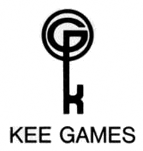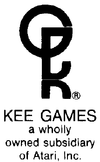Kee Games
Kee Games was an American arcade game manufacturer that released arcade and video games from 1973 to 1978.
 | |
| Industry | Video game industry |
|---|---|
| Founded | 1973 |
| Defunct | 1978 |
| Headquarters | US |
| Products | Arcade games |
| Owner | Joe Keenan |
| Parent | Atari |

History
Kee was headed by Joe Keenan, a friend of Atari co-founder Nolan Bushnell. Keenan managed to hire several defectors from Atari, and began advertising itself as a competitor.[1] In reality, Kee Games was a wholly owned subsidiary of Atari created in response to the pinball and arcade distributors of the time who demanded exclusivity deals.[2] Kee Games released several "clones" of Atari games, allowing Atari to "exclusively" sell games to two distributors at once.
By mid-1974, Atari was having financial and management problems, while Joe Keenan had been very successful managing Kee Games. The two companies merged that September, with Keenan promoted to president of Atari running the business side of things. Atari continued to use the "Kee Games" label to release some of their games until 1978, but from the merger on, the games were clearly labelled "a wholly owned subsidiary of Atari, Inc."
Games
- Elimination (October 1973) — cloned by Atari's Quadrapong
- Spike (March 1974) — a clone of Atari's Rebound, with an extra button labeled "spike"
- Formula K (April 1974) — a clone of Atari's Gran Trak 10
- Twin Racer (July 1974) — a clone of Atari's Gran Trak 20
- Tank (November 1974) — an original game that became very popular
- Pursuit (January 1975)
- Indy 800 (April 1975)
- Tank II (May 1975) — the first game sold under the "Kee" label with the Atari disclosure
- Quiz Show (April 1976)
- Tank 8 (April 1976)
- Indy 4 (May 1976)
- Sprint 2 (November 1976)
- Drag Race (June 1977)
- Super Bug (September 1977)
- Sprint 1 (January 1978)
- Ultra Tank (February 1978)
References
- "Video Game Timeline". Electronic Gaming Monthly. No. 102. Ziff Davis. January 1998. p. 116.
- Perry, Tekla S. (November 2016). "Tales of Atari: New Stories of a Legendary Company Come to Light (online extended version)". IEEE Spectrum. New York, New York: Institute of Electric and Electronics Engineers. 53 (11): 24.
Sources
External links
- Entry at Killer List of Videogames
- Entry at Arcade Flyers